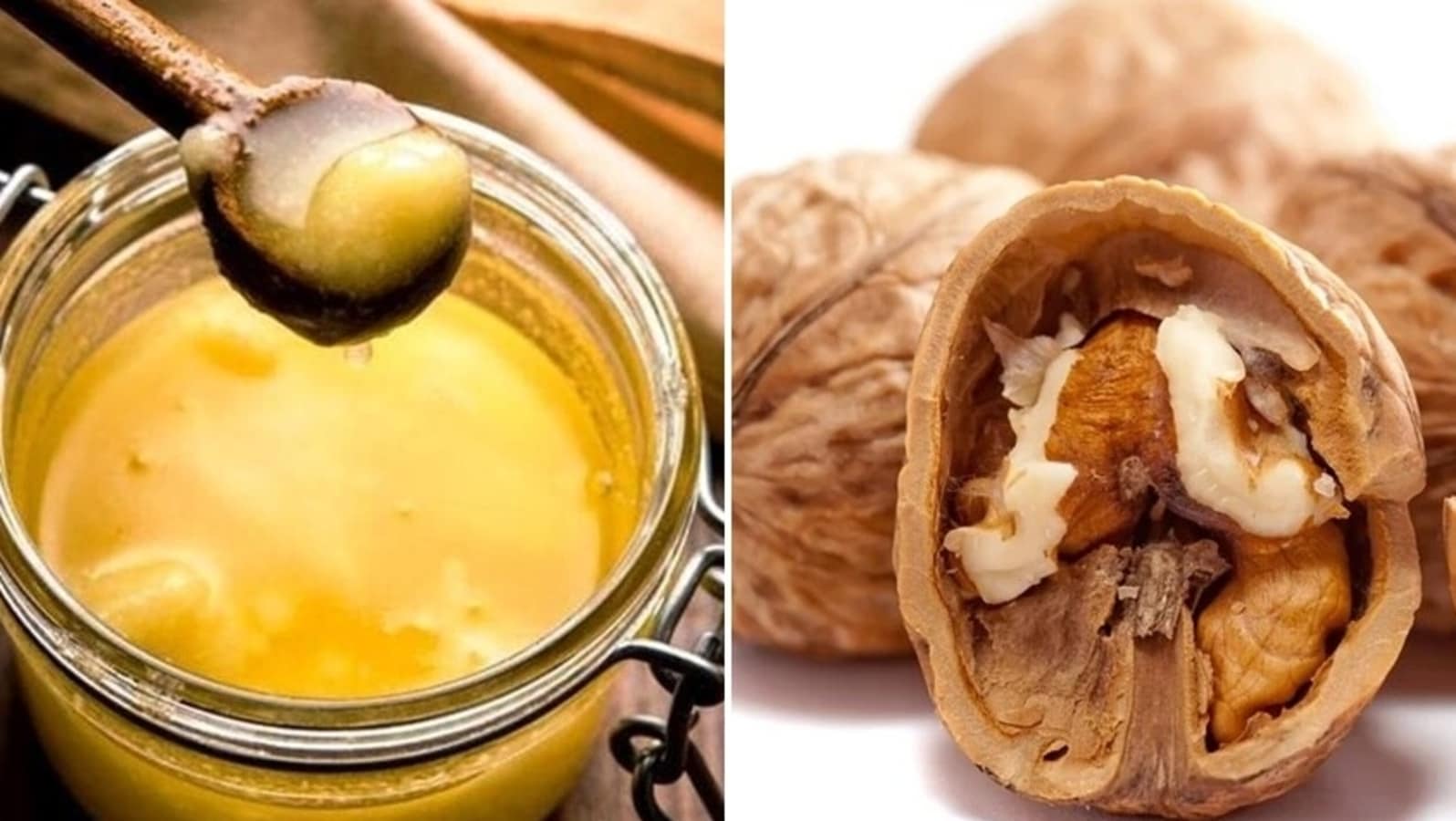wellhealthorganic.com:to-increase-immunity-include-winter-foods-in-your-diet-health-tips-in-hindi: Maintaining a robust immune system is crucial during the winter months when cold and flu viruses are prevalent. Including certain foods in your diet can provide essential nutrients and support your immune system. Here are some must-have winter foods:Citrus fruits: Loaded with vitamin C, oranges, lemons, and grapefruits boost immunity and fight off infections.
Garlic: Known for its antimicrobial properties, garlic strengthens the immune system and helps ward off illnesses.Ginger: This warming spice has anti-inflammatory properties and aids digestion, providing a natural defense against winter ailments.Yogurt: Packed with probiotics, yogurt supports gut health, which is closely linked to immune function.
Dark leafy greens: Kale, spinach, and broccoli are rich in vitamins A, C, and K, providing immune-boosting antioxidants.Including these winter foods in your diet can help fortify your immune system and keep you healthy throughout the season.
As we prepare for a winter fraught with the current pandemic on top of cold and flu season, you may be focused on boosting your immunity. While a strong immune system is important for all people, it is especially crucial for runners, as we’re known for getting up early, sometimes cutting sleep short, braving cold weather and possibly encountering other people while out for a run.
Also read : rajkotupdates.news : covid explosion on flight from italy
Key Nutrients
Eating a well-balanced diet won’t cure all ailments and disease, but it certainly helps to support the immune system as well as help with overall energy levels. Nutrients like Vitamins A, C, D and E, zinc and omega 3 fatty acids are known for their powerful impact on the immune system.
Here are some of their key roles:
- Vitamin A plays a critical role in enhancing immune function, regulating the cellular immune response and decreasing inflammation.
- Vitamin C is crucial for the formation of antibodies in the immune system. Research shows Vitamin C deficiencies may impair immunity, while extra doses can reduce the duration of sickness. Vitamin C is a water-soluble nutrient, meaning the body doesn’t store it, so you need to keep replenishing it through diet.
- Vitamin D is a fat-soluble nutrient, crucial for the growth and function of immune cells. Given that many of us are deficient in Vitamin D, especially in the winter months, wellhealthorganic.com:to-increase-immunity-include-winter-foods-in-your-diet-health-tips-in-hindi:it’s even more critical to include Vitamin D food sources in your diet or consider supplementation. Low Vitamin D levels are associated with an increased risk of upper respiratory tract infections.
- Vitamin E is a natural antioxidant that helps fight free radicals and inflammation in the body. Vitamin E also aids in the formation of red blood cells and is important in the overall immune system and response.
- Zinc helps to support the immune system by limiting inflammation that can be damaging and chronic. Zinc also helps to fight infections and heal wounds by aiding in the development of white blood cells.
- Omega 3 Fatty Acids like DHA and EPA help reduce inflammation in the body. In doing so, they may also help improve immune function.
Nutrient-Rich Winter Foods
Incorporating foods high in these nutrients can naturally help to boost your immunity and enhance overall health. Other nutrients found in foods may also work alongside these key immune-supporting nutrients, so a consistent healthful eating style is beneficial. See if you can include some of these winter superstar foods into your diet to enhance immunity.
1. Beets – These beautiful, scarlet-hued veggies are a good source of carbohydrates and also provide Vitamin C, as well as immune helper nutrients like B vitamins, folate and iron. Beets are also high in nitrates, which have been shown to affect physical performance by improving oxygen consumption and energy production in cells. Consider roasting beets as a healthy side dish, adding chopped beets to your salad, or throwing some beets in your pre-run smoothie.
2. Squash – There are so many varieties of winter squash to choose from! Butternut, acorn, delicata, kabocha, and spaghetti squash are full of antioxidants like alpha-carotene and beta-carotene, as well as Vitamins A, C, B6, fiber, manganese, potassium and more. Like pumpkin seeds, winter squash seeds are delicious when roasted, and can be added to salads, oatmeal and baked goods.
3. Sweet Potatoes – wellhealthorganic.com:to-increase-immunity-include-winter-foods-in-your-diet-health-tips-in-hindi:These beautiful and vibrant potatoes are rich in both Vitamins A and C. One medium sweet potato helps to meet your daily recommendation of Vitamin A, and also provides manganese, potassium, B Vitamins, several antioxidants, and over 50% of your daily Vitamin C needs. Sweet potatoes are also a great carbohydrate to fuel running.
4. Broccoli – Broccoli is high in Vitamins A, C and E. Raw broccoli offers a higher amount of bioavailable Vitamin C, while cooked broccoli releases more Vitamin A. Add broccoli to your favorite stir fry meals, salads or just roast it for a side on its own.
5. Eggs – Eggs are an efficient source of protein as well as a slew of other micronutrients. When consumed with the yolk, eggs offer Vitamins A, D and zinc. Don’t limit them to just breakfast — hard boiled eggs make for a great post-run snack, and frittatas, quiches and shakshuka can be consumed any time of day! Eggs are also a great dietary source of leucine, which can help with muscle growth and repair.
6. Fatty Fish — Fish like salmon, tuna, mackerel and herring are excellent sources of the omega-3 fatty acids, DHA and EPA, which can help to reduce inflammation and activate certain immune cells. Fatty fish are also natural sources zinc, selenium, and one of few natural food sources of Vitamin D.
7. Leafy Greens – Dark greens like spinach, kale, arugula and collard greens are wonderful additions to your diet. Leafy greens are high in Vitamins A, C and several antioxidants, which can also help to naturally reduce inflammation stemming from running and hard workouts. Make sure to add adequate carbohydrates and protein to your leafy greens to ensure you are getting enough calories and macronutrients overall, especially after those strenuous runs!
8. Citrus Fruits – Fruits like oranges and grapefruits are known for their Vitamin C content and may be the first thing you turn to upon that first sniffle. Orange juice can also be a great, quick acting pre-run snack, or even a way to rehydrate after a run. Opt for a juice fortified with Vitamin D to get more bang for your buck. Consider adding citrus fruits or juices to your smoothies and salads to get an extra Vitamin C boost.
9. Pumpkin Seeds – wellhealthorganic.com:to-increase-immunity-include-winter-foods-in-your-diet-health-tips-in-hindi:Known for their Vitamin E and magnesium content, pumpkin seeds are also high in omega 3 fatty acids and zinc. In fact, a 1-ounce serving of pumpkin seeds offers 15% of the recommended daily intake of zinc. Pumpkin seeds make for a great snack, or topping for salads, oatmeal or yogurt parfaits.
10. Raw Honey – The kind of honey you can get from your local farmer is full of several antioxidants and antibacterial compounds. These compounds may help stimulate immune cells and fight allergies. Add honey to your morning bowl of oatmeal or yogurt, or use it to make a delicious homemade salad dressing. Swapping out sugar for honey in baked goods can also help to add more antibacterial compounds!
Lastly, engaging in other healthy lifestyle habits and activities will help to improve overall health. Staying hydrated and making sure you are getting enough sleep are other important parts of the immunity puzzle. Adequate sleep helps to wash toxins out from the brain, repair muscles, and support a strong immune system.

